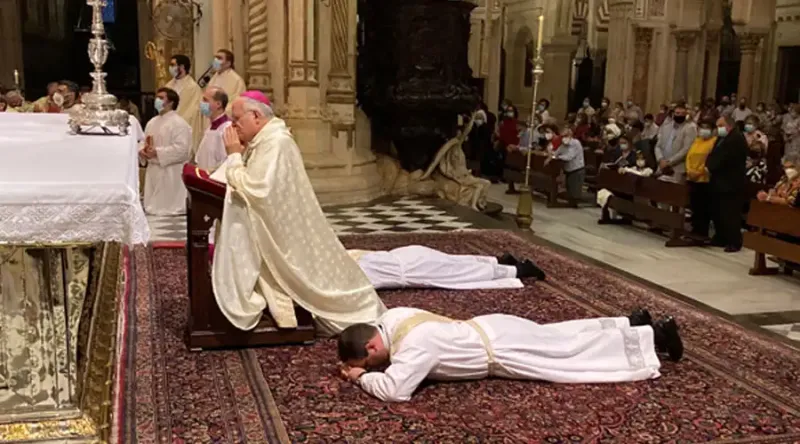
Denver Newsroom, Jun 18, 2022 / 10:00 am (CNA).
In his weekly pastoral letter published a few days before ordaining five new priests on June 18, the bishop of Córdoba, Spain, Demetrio Fernández, wrote that the Catholic Church cannot live without her priests, stressing that they are “a vital necessity.”
“The Church can neither live nor survive without priests. It’s a vital necessity. Because she cannot live without the presence of Christ who continually vivifies her through the sacraments, and especially through the Eucharist,” the bishop said.
“Without priests there is no Eucharist or sacramental forgiveness of sins, or accompaniment to so many people who seek that presence of Christ by their side,” the bishop stressed.
Noting that the path to the priesthood isn’t easy, Bishop Fernández said that those who seek to respond to God in this vocation must seek him in prayer.
“In the serenity of prayer, with the counsel of the formators, and with the help of brother seminarians, the horizon becomes clearer until moral certainty is reached: God is calling me to be his priest, Jesus Christ is calling me to be his totally, people need the priest to draw close to God. Here I am, send me, as the prophet said,” the Spanish prelate wrote.
The bishop pointed out that a priest is a blessing for families, parishes, and fellow seminarians and encouraged young men not to be afraid to say yes to the Lord.
“Young men, if the Lord is calling you on this path, don’t be afraid. These young men who are ordained today are made of the same stuff as you are. And if you have any uneasiness about this direction, put yourself in the hands of a priest who will help you discern,” he encouraged.
“I assure you that if you take this step, you’ll be happy, because there is no greater happiness than giving your life to the Lord and making others happy, giving them to the Lord,” he said.
The bishop encouraged people to pray for priestly vocations to God since, furthermore, “there is no greater sadness for a diocese than not having seminarians, candidates for the priesthood” and “there is no greater joy for a diocese than to have seminarians, who are going to be ordained priests for the service of the holy People of God.”
This story was first published by ACI Prensa, CNA’s Spanish-language news partner. It has been translated and adapted by CNA.
If you value the news and views Catholic World Report provides, please consider donating to support our efforts. Your contribution will help us continue to make CWR available to all readers worldwide for free, without a subscription. Thank you for your generosity!
Click here for more information on donating to CWR. Click here to sign up for our newsletter.





In context of the Bishop’s warning, Daniel prophesies the well known abolition of the daily sacrifice and enshrinement of the abomination of desolation. At present we may hypothesize whether this prophecy has relevance to future changes to the liturgy of the Eucharist, what portent, if any, does the Synod on Synodality have.
Likewise most who read scripture are familiar with 2 Thess 2 and Paul’s reference to the great apostasy and appearance of the lawless one who occupies the sanctuary as if he were God. John in Revelation writes the false prophet is to assist the beast from the sea, and to induce men to adore its image. The first act of the drama concludes with a promise of victory over the beast by the lamb of God. Whatever we may assume regarding these passages we cannot say we should not read them, they were written to be read, and to assess what may be relevant.
“The Church can neither live nor survive without priests. It’s a vital necessity. Because she cannot live without the presence of Christ who continually vivifies her through the sacraments, and especially through the Eucharist” (Bishop Demetrio Fernández). It’s virtually impossible for vocations to cease to exist as it is for the priesthood not to exist unless there were some form of prohibitive measures in place.
Abolition of the Eucharist were it to occur, sans priests reminds us of the great saving gift the Eucharist is. It is the Eucharistic presence in us that draws us away from sin, to pull back when sorely tempted. It’s the daily offer of the body and blood to the Father that stays his hand from retribution. It’s the intrinsic nature of sacrifice and banquet that gives us our daily bread fed to us by the hand of the priest [as it should be]. Surely the Holy Spirit will strengthen us when these prophetic events occur, however the absence of the Eucharist will make the work of the Spirit that much more difficult. Whatever will occur Christ Vincit.
Continued blessings of discernment, insight and wisdom. Thank you.
Tell it to Pope Francis, who seems to berate and belittle priests at every turn.
All who follow Christ need to be rebuked. Constructive criticism leads us to confession and betterment. Though much censure has been directed towards the incumbent, he seems unmoved by it.
Blessings.
“Physician heal thyself”. Yes and yet, I will need a trained doctor from time to time. The engineering project in the back of my mind needs a competent professional to bring the matter to fruition.
Our eternal soul needs tending to as well. A good pastor knows of these matters and rightly handles the word of truth!
Is the end of our life here, the beginning of eternal life with Christ, or does it mean eternal separation from Him?
We want to know that Jesus “is the way and the truth and the life” and a good priest helps show us the way.